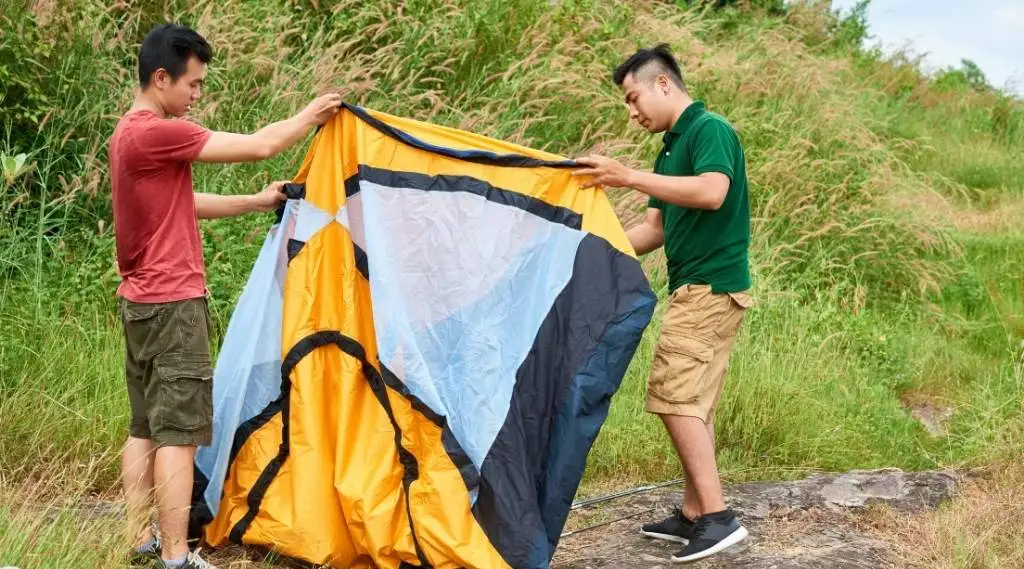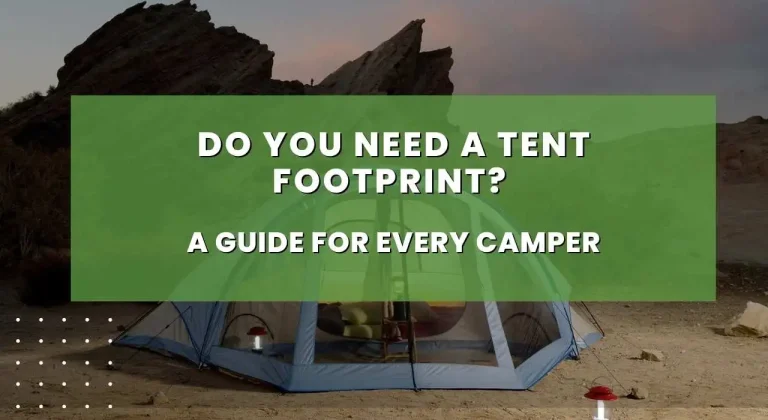Last updated on September 8th, 2023 at 08:07 am
Recently updated on September 8th, 2023 at 08:07 am

Stuffing tents and gear anywhere in the house after coming from a trip is what everyone does. But, that’s not the right way to store your tent. If you want to preserve your tent and other camping gear so you can use them for years, you must follow what experienced campers do. This extensive article on “how to store a tent safely” will provide a step-by-step guide to camping tent storage.
Often, storing your tents in the same way over and over can lead to the permanent and premature breaking of your tent’s fabric. To avoid such mistakes, you can get help from this guide and increase the life of your backpacking tents.
Here are the critical steps involved in safe and sound camping tent storage.
How to Store A Tent Safely: Steps Involved In Storing A Tent After Camping
- Cleaning
- Drying
- Storing
1. Cleaning – The First Step to Preserving Your Tent
A tent that returns from camping has several contaminants, including bird droppings, mud, dried leaves, dust particles, your pet’s waste, and sap from trees. The organic waste could breed mold on your tent, exposing it to unstoppable decay. The wood sap, dried leaves, and mud can make it smelly. In short, all these contaminants contribute to degrading your tent if it is not washed properly.
Now the question arises, “how to clean tent after camping.” Luckily, cleaning your tent is not rocket science. All you need to do is gently remove the contaminants with your hands (gloves). And then, you can wash it with any regular detergent. Some stains are sticky and need gentle scrubbing; a sponge or even a toothbrush will do. The moving parts of your gears, like zippers, need extra attention. It is best to wash them properly and remove all the dirt using a brush or scrubber so that no dirt can impair their free movement.

Finally, put it in the washer with plenty of fresh water and put it in the dryer to remove all the water from the tent.
A tent that returns from camping has several contaminants, including bird droppings, mud, dried leaves, dust particles, your pet’s waste, and sap from trees. The organic waste could breed mold on your tent, exposing it to unstoppable decay. The wood sap, dried leaves, and mud can make it smelly. In short, all these contaminants contribute to degrading your tent if it is not washed properly.
To effectively clean your tent, Click here to read how to clean a moldy tent.
2. Drying
The best way to dry your tent is to put it in the shade. From drying lines to banisters, doors, and even chairs and tables, you can choose anything that can hold your tent fully open so that every part gets dried properly. Avoid drying your tent in the sun for extended periods, as it could fade your tent’s colors or even de-laminate its top layer.

Finally, do not fold the tents right after drying them; check them properly with dried hands if any moisture remains. Proper drying of a tent is as necessary as cleaning because tents, if not dried out properly, can have water droplets. These water molecules make your tent stinky and damage its lamination sheet, which is responsible for the wind and waterproofing of a tent.
3. Storing
Storing a tent involves two further steps, i.e., where to keep a tent and how to store it. These considerations are crucial for increasing the tent’s effectiveness and service life.
The best place to store a tent
Well-ventilated, dry, and cold places to store a tent are ideal because there are fewer chances for mold to breed in such sites. A mold is a microbe that feeds on organic materials and secretes enzymes that could decompose the tent’s material. So, selecting the wrong place or an inappropriate tent storage bag can damage your tent, no matter how well it is washed and dried.

Some places that may work for you include your car garage, the space above your almirah, your bed, or even an adequately ventilated cold shed. You can make a shelf to protect and display your backpacking gear as a camper.
The Best Way to Store A Tent – Tent Care 101
The bags given with the tents are only for carrying them while camping, but they are not good for keeping your tents for long. The main reason is that in those bags, tents are kept by folding them in a very compact manner, which causes permanent wrinkles and compromises their material’s breathability.
Therefore, compromised breathing and a lack of stretching can cause the premature breakdown of tent material if kept for extended periods.

So, it is always best practice to pack your tent loosely and store it in fabric with maximum breathability. For this purpose, you may use cotton, polyester, or poly-cotton covers. Moreover, to ensure the dryness of your tent, you may use silica gel packs to absorb any moisture left after drying and keep your tent intact.
Frequently Asked Questions
How to dry out a tent after washing it?
To dry a tent after washing it, set it in the shade and let it air-dry. And if you don’t find enough space, you can hang or spread it on a large, flat surface. To get it thoroughly dried, flip it upside down when its upper surface looks dry.
How long will a tent last in storage?
Depending on the place and storage methods, the life span of tents varies from tent to tent. Generally, nylon tents can last up to 30–40 years and cotton tents about 50 years when they are well cared for.
How do you store a tent for winter?
Clean your tent from all the mud, dust, and other contaminants, and wash it if needed. Dry it out in the shade, then pack it loosely in a breathable covering. That’s how you can store your tent for the winter.
Conclusion
Camping is one of the most thrilling activities, and we usually prefer it during our vacations, which typically come once a year. So, spending money every time you plan to go camping is very undesirable. This article gives you step-by-step instructions on how to store a tent safely, so you can get the most out of it on every trip. These tips will not only increase your tent’s service life but also make it free of stinky odors. Did you find this article helpful? Share your thoughts in the comments.






